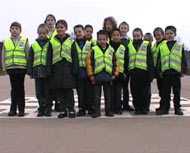Article from: www.thenewspaper.com/news/19/1998.asp
10/3/2007
UK: Kids Learn to Use Speed Cameras in Primary School
UK primary school students given speed cameras and tasked to spread an approved road safety message throughout the school.
 UK officials are handing speed cameras to primary school students in an effort to bolster support for photo enforcement among children aged between seven and eleven. Loddington Primary School students, for example, have clocked motorists with a speed camera in the town of Kettering as part of an effort promoted by the Northamptonshire County Council and the region's speed camera partnership.
UK officials are handing speed cameras to primary school students in an effort to bolster support for photo enforcement among children aged between seven and eleven. Loddington Primary School students, for example, have clocked motorists with a speed camera in the town of Kettering as part of an effort promoted by the Northamptonshire County Council and the region's speed camera partnership.
Throughout the UK, schools participating in the national program appoint one fifth-year and one sixth-year student to serve as "Junior Road Safety Officers" for the year. They are each given a fluorescent yellow vest and told to "take control of road safety in the school." In Cheshire, the junior road safety officers are also tasked with "keeping the whole school up to date with the latest road safety message" such as the importance of not speeding -- even though the students will not have a license for at least another six years -- and the importance of crossing the street properly.
Local governments have also tasked junior road safety officers with performing "child audits" of various government programs, including the Safe Routes to Schools funding. The child's report addresses questions such as the adequacy of the lighting and crossing locations, whether vehicles have slowed near schools and whether cycling is the safest means of going to school. Transport for London (TfL) officials credited the city's 550 junior road safety officers with reducing accidents by 62 percent.
"The first year of the TfL Junior Road Safety Officer scheme got a brilliant response from schools across London," said TfL program manager Janet Kirrage. "This initiative, led by children for children, is playing a vital role in the work TfL is doing to reduce child road casualty figures in London -- which have fallen by 62 per cent since the mid to late 1990s."
 UK officials are handing speed cameras to primary school students in an effort to bolster support for photo enforcement among children aged between seven and eleven. Loddington Primary School students, for example, have clocked motorists with a speed camera in the town of Kettering as part of an effort promoted by the Northamptonshire County Council and the region's speed camera partnership.
UK officials are handing speed cameras to primary school students in an effort to bolster support for photo enforcement among children aged between seven and eleven. Loddington Primary School students, for example, have clocked motorists with a speed camera in the town of Kettering as part of an effort promoted by the Northamptonshire County Council and the region's speed camera partnership.